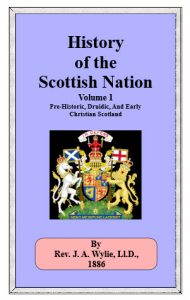DR. WYLIE’S HISTORY IS PUBLISHED BY THE REFORMATION ONLINE the most timely site on the Internet www.reformation.org. All this history has been covered up!!
Note to the Reader Dr. Wylie’s book was published in 1886. It disappeared from off the face of the earth around the turn of the century. Even the copy in the Library of Congress was stolen.
We are confident that if the book had remained in circulation there would be no divided Ireland today!! A true knowledge of history is vital––-Rome has poisoned the wells of history, and multitudes have drunk of that contaminated water.
When you are sick physically, the first question the doctor asks is about your medical history, in order to affect a cure. The same is true in a spiritual sense . . . woe unto the people whose historians are their enemies!! In the Book of Revelation, chapter 12, the woman clothed with the sun – a picture of the true Church – has to flee into the wilderness to escape the wrath of the Great Red Dragon. Hibernia and Caledonia was the wilderness at that time, lying beyond the bounds of the Roman Empire. Ireland was always the true home of the Scots.
The name of the country was changed around the time of the Reformation. St. Patrick in his Confession mentions the sons of the Scotti and the daughters of the chieftains, especially one blessed Scottish princess that he baptized (una benedicta Scota). All writers up the time of the Reformation refer to the inhabitants of Hibernia as the Scottish Tribes. Brian Born (930-1014) High King of Hibernia and victor over the Vikings at the Battle of Clontarf, has his name inscribed in the Book of Armagh as Imperatoris Scotorum, that is: Emperor of the Scots.
In the year 1150, a famous book was written by Christian Malone , Abbot of Clonmacnoise, entitled Chronicum Scotorum. It is a chronology of Hibernia from the Flood to the 12th century. St. Patrick is the Apostle of the Scots – on both sides of the Irish Channel. Both people fought the same enemies for centuries: Vikings, Danes, Anglo-Normans, etc., etc. Jesus said that the gates of hell would not prevail against the true Church and we find remnants of the Gaelic Church surviving right down to the blessed Reformation.
We have retained the English spellings and endnotes appear at the end of each chapter
